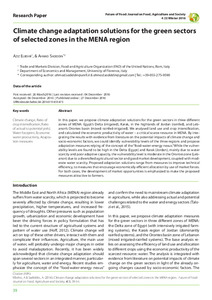Aufsatz

Climate change adaptation solutions for the green sectors of selected zones in the MENA region
Zusammenfassung
In this paper, we propose climate adaptation solutions for the green sectors in three different zones of MENA: Egypt’s Delta (irrigated), Karak, in the highlands of Jordan (rainfed), and Lebanon’s Orontes basin (mixed: rainfed-irrigated). We analysed land use and crop intensification, and calculated the economic productivity of water – a critical scarce resource in MENA. By integrating the results with evidence from literature on the potential impacts of climate change and socio-economic factors, we could identify vulnerability levels of the three regions and propose adaptation measures relying of the concept of the “food-water-energy nexus.” While the vulnerability levels are found to be high in the Delta (Egypt) and Karak (Jordan), mainly due to water scarcity and poor adaptive capacity, the vulnerability level is moderate in the Orontes zone (Lebanon) due to a diversified agricultural sector and good market development, coupled with moderate water scarcity. Proposed adaptation solutions range from measures to improve technical efficiency, to measures that encourage economically efficient allocation by use of market forces. For both cases, the development of market opportunities is emphasized to make the proposed measures attractive to farmers.
Zitierform
In: Future of Food: Journal on Food, Agriculture and Society. Witzenhausen : University of Kassel, Department of Organic Food Quality and Food Culture. - Vol. 4, No. 3 (2016), S. 39 - 54Zitieren
@article{urn:nbn:de:hebis:34-2016111451473,
author={Elbehri, Aziz and Sadiddin, Ahmad},
title={Climate change adaptation solutions for the green sectors of selected zones in the MENA region},
year={2016}
}
0500 Oax 0501 Text $btxt$2rdacontent 0502 Computermedien $bc$2rdacarrier 1100 2016$n2016 1500 1/eng 2050 ##0##urn:nbn:de:hebis:34-2016111451473 3000 Elbehri, Aziz 3010 Sadiddin, Ahmad 4000 Climate change adaptation solutions for the green sectors of selected zones in the MENA region / Elbehri, Aziz 4030 4060 Online-Ressource 4085 ##0##=u http://nbn-resolving.de/urn:nbn:de:hebis:34-2016111451473=x R 4204 \$dAufsatz 4170 7136 ##0##urn:nbn:de:hebis:34-2016111451473
<resource xsi:schemaLocation="http://datacite.org/schema/kernel-2.2 http://schema.datacite.org/meta/kernel-2.2/metadata.xsd"> 2017-01-03T16:51:27Z 2017-01-03T16:51:27Z 2016-12-27 2197-411X urn:nbn:de:hebis:34-2016111451473 http://hdl.handle.net/123456789/2016111451473 eng Department of Organic Food Quality and Food Culture at the University of Kassel, Germany and Federation of German Scientists (VDW) Urheberrechtlich geschützt https://rightsstatements.org/page/InC/1.0/ Climate Change Ratio of crop intensification Ratio of actual to potential yield Water footprint Economic water productivity Adaptation measures 630 Climate change adaptation solutions for the green sectors of selected zones in the MENA region Aufsatz In this paper, we propose climate adaptation solutions for the green sectors in three different zones of MENA: Egypt’s Delta (irrigated), Karak, in the highlands of Jordan (rainfed), and Lebanon’s Orontes basin (mixed: rainfed-irrigated). We analysed land use and crop intensification, and calculated the economic productivity of water – a critical scarce resource in MENA. By integrating the results with evidence from literature on the potential impacts of climate change and socio-economic factors, we could identify vulnerability levels of the three regions and propose adaptation measures relying of the concept of the “food-water-energy nexus.” While the vulnerability levels are found to be high in the Delta (Egypt) and Karak (Jordan), mainly due to water scarcity and poor adaptive capacity, the vulnerability level is moderate in the Orontes zone (Lebanon) due to a diversified agricultural sector and good market development, coupled with moderate water scarcity. Proposed adaptation solutions range from measures to improve technical efficiency, to measures that encourage economically efficient allocation by use of market forces. For both cases, the development of market opportunities is emphasized to make the proposed measures attractive to farmers. open access In: Future of Food: Journal on Food, Agriculture and Society. Witzenhausen : University of Kassel, Department of Organic Food Quality and Food Culture. - Vol. 4, No. 3 (2016), S. 39 - 54 Elbehri, Aziz Sadiddin, Ahmad </resource>
Die folgenden Lizenzbestimmungen sind mit dieser Ressource verbunden:
Urheberrechtlich geschützt

